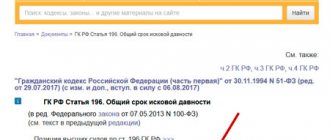The concept of statute of limitations in taxation
The tax statute of limitations is enshrined in paragraph 1 of Art.
113 Tax Code of the Russian Federation. This provision states: “A person cannot be held accountable for committing a tax offense if 3 years have elapsed from the day it was committed or from the next day after the end of the tax period during which the offense was committed until the decision to bring it to justice is made.” " As we can see, this provision establishes a limitation period only for liability for an offense, but does not apply to the limitation period for fulfilling the obligation to pay tax. It follows that there is no time frame in the Tax Code of the Russian Federation after which the taxpayer would be relieved of the obligation to pay tax.
But this is in the general case. The Code makes an exception for the statute of limitations for transport tax on individuals.
What is it about
In tax law, there is a distinction between the statute of limitations for bringing to liability and the statute of limitations for paying taxes, the main differences are given in the table:
| Who makes the decision | Federal Tax Service of the Russian Federation (FTS of Russia) | Judicial bodies of the Russian Federation |
| Sources of law | Art. 113, paragraph 4 of Art. 397, art. 70 Tax Code of the Russian Federation | – 48 Tax Code of the Russian Federation |
| Meaning | Extrajudicial collection procedure | Collection based on a court decision (order) |
| Duration | 3 years (or 3 tax periods) | 6 months, 2 years - for individual cases |
The Russian Tax Service uses a number of effective tools to collect unpaid taxes and arrears out of court. If officials of the Federal Tax Service apply to the judicial authorities, the statute of limitations has legal significance.
Limitation period for transport tax for individuals
Everyone knows that individuals do not calculate transport tax on their own, but pay it on the basis of a notification received from the tax office (clause 3 of Article 363 of the Tax Code of the Russian Federation). Tax authorities must send such a notification no later than 30 days before the payment is due (Clause 2, Article 52 of the Tax Code of the Russian Federation). The transport tax must be paid by citizens no later than December 1 of the year following the expired tax period (clause 1 of Article 363 of the Tax Code of the Russian Federation). In 2021, this is Sunday, so the payment deadline is shifted to 12/02/2019.
For more details, see: “Tax notice for transport tax (sample)”.
At the same time, the Tax Code of the Russian Federation limits the period for sending a notification to the Tax Code: it can be sent no more than 3 tax periods preceding the calendar year of its sending (clause 3 of Article 363 of the Tax Code of the Russian Federation). For example, in 2021, the inspectorate has the right to demand payment of tax only for 2021, 2021 and 2021. The taxpayer is not required to make payments for earlier periods. That is, in fact, the Tax Code of the Russian Federation establishes a 3-year limitation period for the transport tax of individuals.
If your car has been stolen, and the Federal Tax Service requires you to pay transport tax, use the advice of ConsultantPlus experts and find out what to do in this case. If you don't have access to the system, get a free trial online.
How to write off debts to a pension fund?
The pension fund may recognize financial sanctions as hopeless for collection and write them off.
Resolution of the Board of the Pension Fund of the Russian Federation dated August 28, 2017 No. 600p approved the procedure for writing off financial sanctions, according to which the write-off is carried out on the basis of a decision made to recognize them as hopeless for collection.
According to Art. 11 Federal Law No. 436 dated December 28, 2017, arrears on insurance contributions to extra-budgetary funds of the Russian Federation for periods that expired before January 1, 2017, attributed to individual entrepreneurs and other persons engaged in private practice are recognized as uncollectible and subject to write-off. The decision is made by the tax office.
Deadline for forced collection of transport tax
The inspectorate has the right to compulsory collection if the obligation to pay tax is not fulfilled by the taxpayer on time. Moreover, in relation to transport tax, such an obligation arises for the latter no earlier than the date of receipt of the tax notice. This follows from paragraph 2 of Art. 44, paragraph 3 of Art. 363 Tax Code of the Russian Federation.
If the payment deadline is missed, tax authorities begin collection proceedings. First, a requirement to pay the TN is issued. Moreover, the deadline for sending a claim depends on the amount of debt. So, for an arrears of 500 rubles. or more, it is 3 months from the date of discovery of the fact of non-payment. If the arrears are less than 500 rubles, the demand must be sent to the taxpayer no later than 1 year from the date of its discovery (Clause 1 of Article 70 of the Tax Code of the Russian Federation).
The Tax Code of the Russian Federation allows 8 working days to fulfill the requirement, unless a longer period is specified in the requirement itself (Clause 4, Article 69 of the Tax Code of the Russian Federation). In case of failure to comply within the specified period, tax authorities have the right to apply to the court with an application to collect the tax at the expense of the taxpayer’s property (Clause 1 of Article 48 of the Tax Code of the Russian Federation).
The period for going to court is 6 months. However, the beginning of its flow is tied to the amount of the amount collected. So, for debt over 3,000 rubles. it begins from the moment of expiration of the period allotted for fulfilling the requirement (clause 2 of article 48 of the Tax Code of the Russian Federation). The tax authorities must monitor the smaller amount of arrears for 3 years. If during this period the amount of the taxpayer’s debt for various claims exceeds the specified limit, the 6-month period will begin counting from the date when the amount exceeded 3,000 rubles. If it is not possible to accumulate so many debts in 3 years, the term will begin to count at the end of these 3 years.
When all these deadlines expire, the controllers will lose the right to collect the debt. The court, of course, can restore the missed collection period, but it will do this only for good reasons (clause 2 of Article 48 of the Tax Code of the Russian Federation).
You can confirm our conclusions by receiving a free trial access to ConsultantPlus and move on to an expert opinion.
Responsibility measures
The first thing debtors should remember is the accrual of penalties.
The fine is accrued from the next day the tax debt appears, and is 1/300 of the Central Bank refinancing rate. For organizations, this rate is valid only for the first month. Then the rate changes to 1/150, and remains at this level until the debt is repaid. In addition, the legislator provides a system of monetary fines in the amount of:
- 20% of the amount of unpaid taxes, if the offense does not involve malicious intent;
- 40% if the debtor deliberately evades taxes.
Read also: Is it possible to close an individual entrepreneur with debts?
In some cases, the perpetrators may be held criminally liable under Art. 199 of the Criminal Code of the Russian Federation. Based on this document, those found guilty face a fine of up to 300,000 rubles or imprisonment for up to 2 years. If the crime is committed on an especially large scale or by prior conspiracy by a group of persons, the penalties are toughened. In particular, the fine increases to 500,000 rubles, imprisonment - up to 6 years.
Important! The basis for bringing individuals to criminal liability for non-payment of taxes is considered to be debt in excess of 900,000 rubles. For legal entities and organizations, the liability threshold is 5,000,000 rubles.
Results
The statute of limitations for transport tax for payers - individuals is actually three years. Tax officials cannot present taxes for payment for earlier periods. If you fail to fulfill your obligation to pay taxes on time, the inspectorate may begin collection. The collection procedure and terms are strictly defined by the Tax Code.
Sources: Tax Code of the Russian Federation
You can find more complete information on the topic in ConsultantPlus. Free trial access to the system for 2 days.
This might also be useful:
- Fixed payments for individual entrepreneurs in 2021 for themselves
- What taxes does the individual entrepreneur pay?
- Calculation of income tax from salary
- VAT return 2021
- Inspection of individual entrepreneurs by the tax inspectorate
- How much taxes does an individual entrepreneur pay in 2021?
Is the information useful? Tell your friends and colleagues
Dear readers! The materials on the TBis.ru website are devoted to typical ways to resolve tax and legal issues, but each case is unique.
If you want to find out how to solve your specific issue, please contact the online consultant form. It's fast and free!
Preventive periods
The Tax Code does not establish any rules regarding other types of mandatory contributions. There is no general procedure provided for in accordance with which taxes could be written off for a particular period. If rights are violated, the control body goes to court to restore them. The authorized body is guided by the provisions of the law and the concepts of time restrictions.
And if the Tax Code establishes statutes of limitations for at least two taxes, the Civil Procedure Code does not provide for such provisions specifically for this type of requirement. How do courts act in this case? Let’s say the Federal Tax Service makes a demand to forcibly withhold land tax from a subject. There is no statute of limitations here. However, there is a pretrial period. It differs from the statute of limitations in that it begins not from the moment the obligation to make a deduction arises, but from the date the demand for payment of the imputed amount is sent. For legal entities, this period lasts 2 years, for citizens - 6 months.
Fulfillment of obligations to the budget
The legislation establishes that persons recognized as taxpayers must make deductions provided for in the Tax Code. Obligations to the budget will be considered fulfilled from the moment of presentation of an order to the bank to carry out the corresponding operation if there are sufficient funds in the subject’s account. If a person has outstanding payments and does not have sufficient finances to satisfy the claims made, the tax will be considered unpaid. Obligations will also be considered outstanding if the order is withdrawn from the bank. If the payment must be made by a tax agent, then the legal requirement is considered fulfilled from the moment it deducts the established amount from income. Failure to fulfill obligations to the budget serves as a basis for the use of compulsory measures to collect arrears.
How to write off taxes under the tax amnesty?
The tax authorities write off taxes under the tax amnesty independently.
In some cases, due to a technical error or other reasons, the tax office may not write off the tax, and therefore the individual or individual entrepreneur will be in debt. In such a situation, the taxpayer should submit an application to the tax office, indicating a request to write off the debt.
At the same time, the procedure does not provide for the initiation of a procedure for recognizing a debt as uncollectible at the request of the taxpayer, since the tax office itself decides to write off taxes or not.
Statement of claim for write-off of tax debt
Taxpayers may file an administrative claim in court to declare tax debts uncollectible. The following information must be indicated in the claim:
- name of the court that will hear the claim
- information about the plaintiff (full name, address, telephone number)
- information about the tax defendant (name, address, TIN)
- title of the document – administrative statement of claim
- the text of the claim must set out the circumstances of the case, why the debt should be considered uncollectible with legal justification
- the pleading part sets out specific requirements that the plaintiff asks the court to satisfy
- the list of attachments indicates the documents attached to the claim
- at the end of the claim there must be a signature of the plaintiff
USEFUL : watch a video with tips on filing a claim, and also order a ready-made version from our lawyer
Actions of control bodies
Forced collection is carried out in accordance with the decision of the Federal Tax Service. The procedure involves sending a collection order to a banking organization to debit funds from the account of the payer or agent. This order must be executed no later than 1 business day following the date of its receipt (for ruble accounts). If there are no or insufficient funds in the payer’s account, the Federal Tax Service’s requirement is fulfilled as the money arrives. If the control body does not have information about the subject’s settlement account, it has the right to recover the amount from the property of the obligated person. Forced collection of arrears is carried out by decision of the head of the Federal Tax Service. Within three days from the date of its issuance, the resolution is sent to the bailiff. The period for its execution is 2 months. The requirements are satisfied sequentially in relation to:
- Cash.
- Property not involved in the production of goods.
- Finished products.
- Materials and raw materials used directly in production, machines, buildings, equipment, structures, etc.
- Property that is transferred in accordance with an agreement for the disposal, use, or possession of other persons without them receiving ownership rights.
- Other material assets.
The obligation to the budget will be considered fulfilled from the moment the seized property is sold from the payer and the resulting debt is repaid from the proceeds.
Claims for individuals
The amounts of fees paid by taxpayers make up a significant part of the country’s treasury fund, allowing them to maintain the state structure, provide for the army, the management system, provide social guarantees to the population, etc. Therefore, work to collect unfulfilled obligations is carried out in a strict manner, in accordance with the regulations of tax legislation.
Next, you should find out how long the tax office can legally collect the debt. An individual procedure for assigning a payment period is applied to each budget payment. Clear limits of three years apply exclusively to property and motor vehicle fees.
For example, the taxpayer received a notice with the amount due for four previous periods. The deadline for collecting tax debts of individuals has been violated, so the citizen pays an amount partially equivalent to the last three years. And the last period is subject to challenge through an appeal to the Federal Tax Service.
The limit also applies to the time limits for bringing citizens to justice for unlawfully obtaining a tax deduction. For example, after receiving paid medical services, an individual reported to the inspectorate for an income tax benefit. After three years, it turned out that the primary documents were false and illegal reimbursement of funds from the treasury was made. The tax office will no longer be able to bring a claim against the violator to recover the overpayment.
In relation to penalties and fines, the legislation does not have strict time limits; in court proceedings, the generally established time limits for claims for civil relations will be considered.
In general, a pre-trial period for collecting tax debts is applied to individuals: no more than six months should pass from the moment the debtor is sent a request for the need to repay the budget fee. If the claim is filed late, the court has the right to make a decision to refuse to satisfy it.
When collecting from individuals, their own legal acts are applied
Collection after three years
Art. 113 of the Tax Code of the Russian Federation determines the total duration of filing claims for outstanding amounts of taxes by three years, but there are nuances that determine the starting point of this period. It has been established for certain that transport and property fees are limited by the time of claim, not exceeding three reporting periods.
If there are no funds to repay the debt, the debtor's property may be seized
For each case, the duration of debt collection is determined in a special manner, taking into account all the subtleties of the case, discrepancies in tax legislation and the specific judicial position. Based on practice, we can say with confidence that the Federal Tax Service can collect taxes to replenish the budget after three years.
Summary
Thus, a taxpayer who has paid more to the budget than required has the right to a written request to the tax authorities for a refund of overpaid funds within 3 years. The limitation period, including for taxes, ends when the taxpayer takes actions that indicate recognition of the debt. The time frame for going to court is reduced for tax authorities to six months in situations where the individual debtor is not an individual entrepreneur. As we see, in the field of taxation, time periods are of great importance. But there are also many features that can drag out the proceedings for a long time. Of course, it is better not to allow any delays or arrears in payments to the tax office, and to conscientiously fulfill all existing obligations. It can be concluded that the issue of determining the statute of limitations applicable to non-payment of taxes is characterized as confusing and quite complex. In a situation where the payment demands made by the tax service seem incorrect, we recommend that you seek help from professional lawyers
Important point
As mentioned above, the court may refuse the control authorities their request. However, this is only possible if the subject sends a petition indicating that the statute of limitations for paying taxes has already passed. If this is not stated, the court has the right to consider and even satisfy the requirements of the Federal Tax Service. Of course, a person can appeal the decision. In this case, the provisions of the Code of Civil Procedure will apply.









